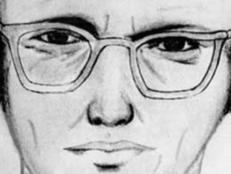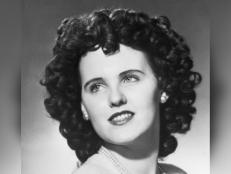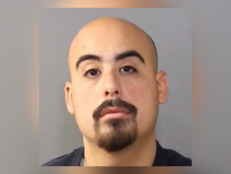Inside The Controversial Claim That Killer H. H. Holmes Was Also Jack The Ripper
An interview with Jeff Mudgett, the great-great-grandson of H. H. Holmes.
![H. H. Holmes [public domain/Wikimedia Commons]; E-fit of Jack the Ripper [Scotland Yard]](http://investigationdiscovery.sndimg.com/content/dam/images/investigationdiscovery/crimefeed/legacy/2017/10/H-H-Holmes-Jack-the-Ripper-Wikimedia-Commons-Scotland-Yard-10172017.jpg.rend.hgtvcom.616.347.suffix/1569856816763.jpeg)
H. H. Holmes [public domain/Wikimedia Commons]; E-fit of Jack the Ripper [Scotland Yard]
Jeff Mudgett was 40 years old when he learned a deep, dark family secret — his great-great-grandfather was Herman Webster Mudgett (above left), most commonly known as H. H. Holmes. This revelation sent him reeling through a psychological exploration that he documented in his fiction-based-on-fact book "Bloodstains."
He also threw himself into researching his nefarious ancestor, and in the process, came up with the theory that in addition to the swath of slayings and grift that Holmes left behind him all over the United States, he was also responsible for the murders in London attributed to Jack the Ripper.
CrimeFeed talked to Mudgett about forensic evidence, Holmes’ body count, and fact vs. fiction.

Jeff Mudgett [Courtesy of HISTORY]
Had you ever heard of H. H. Holmes before the big reveal from your grandfather?
No, and I’m glad you picked that up. That’s basically what "Bloodstains" is about. It’s a psychological journey that I went on having heard from my grandfather this terrible secret that he had kept quiet about from the entire family, including my grandmother, and how it changed my life, and how I decided that I had obligations to the innocents that my ancestor had horribly murdered. I gave up my career. I gave up everything to try to come to some type of answer about origin, about identity, about heritage, and about destiny. I hope that’s what came across in the book.
One thing you’re very clear on is, as printed right on the book, that it’s fiction. I think some people may be a little frustrated, expecting it to be a memoir full of facts. Obviously, it is based on a character with your name; it’s based around real things. Can you talk about what in "Bloodstains" is real as opposed to fiction?
Well, that has to do with my— Remember Truman Capote’s "In Cold Blood"?

Bloodstains cover art [courtesy Jeff Mudgett]
Yes. That’s also a little controversial, isn’t it?
Yeah. That has to do with my disagreement regarding authors filling gaps with theories and conjecture and then trying to call the book nonfiction. I just refused to do that. There’s portions of "Bloodstains" that were my imagination trying to fill in places that I couldn’t factually discover about Holmes. Rather than fib that, as I think some authors do these days, I decided it’s a piece of fiction based on a true story, and my readers need to jump into my shoes and see where they would’ve been had their grandfather told them this horrible secret.
One thing I thought was interesting in "American Ripper," when you’re discussing Holmes and how there’s controversy about the number of his victims, you point out that he leaves us to question what’s true and what’s invented. I thought, wow, that’s kind of like "Bloodstains" as well, right? Something you might have in common with your ancestor.
There’s no doubt about that. I see new books about Holmes and the Ripper come up all the time, and how many people they actually murdered is always a healthy debate. What I try to remind people is that Holmes was a doctor who paid for his tuition by robbing graves between classes and selling the skeletons. This is a man who built a “Murder Castle” with a furnace and acid baths in order to remove human remains. The number of people that were associated with Holmes who went missing and have never been discovered is simply amazing. I think it’s foolish for anyone to try to come up with a number that Holmes in fact murdered until we get permission one day to possibly excavate the grounds at 63rd and Wallace [the former site of Holmes’ Murder Castle in Chicago].
Even he himself changed his confession from sometimes hundreds of victims, and then once he said he was only responsible for two deaths, right?
I know he confessed to 27, but historians later discovered there were people among those 27 that were still living.
Right.
I know for a fact that he killed four members of one family. I know a number of his mistresses went missing. I know that when you go back through history and trace anyone who did business with him, had contracts with him, were involved in any of the frauds that he was involved in, many of them just come up missing. I think that’s one of the great things that this platform is giving me — to stand up and maybe see more effort put into these innocents, that we can’t just forget about them. I think we owe them something. The something is possibly identifying their remains one day and finding out what actually happened to them. That’s what I think my obligation is because of who I am.
There are some people who argue that maybe Holmes wasn’t so much of a serial killer, that he was really just a con man who specialized in insurance fraud. How do you respond to that?
I think I know the book you’re talking about, and I try not to debate other authors regarding their theories. They have a right to write the book how they see it. Have you ever read the 1943 article by "Harper’s" about Holmes? That, to me, is the finest piece of literature about Holmes yet and incredibly accurate. They describe your question concerning his talent at cons — it’s almost sad that he had to evolve into these murders because had the story just been about what a brilliant con artist he was, it would’ve been much more entertaining. The Chicago Tribune called him the greatest con that ever struck Chicago, which is quite a claim. That story gets set aside because we all tend to be fascinated with the serial killer.
Of course, everyone was also fascinated with Jack the Ripper before people were really talking about H. H. Holmes, and the possibility that they could be the same man is incredible. When you gave your TED Talk, you showed some really compelling evidence about their physical resemblance and the handwriting. But is the “Dear Boss” letter in question as to whether that was actually written by the killer or not?
Your question’s right on. There are many Ripper-ologists who believe the “Dear Boss” was a hoax written by a journalist. Having studied that letter for a decade, that’s not my belief at all. This was a letter that was written before the two murders that the letter describes, even mentioning what’s going to be done to the ears on the victims, which in fact happened. How history can go back to say this was a hoax, I have no idea whatsoever. This was the letter written by the killer of Catherine Eddowes and Elizabeth Stride.
In the first episode of "American Ripper" it looks like you’re leaning toward establishing that Holmes was probably not in Chicago during the months in question in 1888. In the TED Talk you hinted that there could be records that he took a ship to London, and his name is on a ship manifest or something. I’m wondering if you have any evidence pointing that out?
As a matter of fact, we do, and that’s something I’m going to have to defer to and ask you to tune in to later episodes. My cohost, [ex-CIA undercover operative and criminologist] Amaryllis Fox, does a great job going through the passenger lists on the ships going from New York to Southampton before those killings. I think she comes up with some amazing evidence.

Amaryllis Fox [Courtesy of HISTORY]
It must be tricky, knowing how many aliases Holmes used. How many names are you possibly looking for as you go through these lists?
That’s part of what makes proving conclusively, beyond a reasonable doubt, that Holmes was Jack the Ripper almost impossible. The man had 31 aliases, and we think we’ve nailed down that he used at least five on these passenger lists. As an ex-practicing trial lawyer, I can tell you this — that would be very difficult to establish in court to a jury and walk away having proven the fact. I think we do a great job of providing our audience in "American Ripper" with, well, here’s a great possibility, and if you run this through the mounds of circumstantial evidence that we’re also going to present, along with the handwriting comparison, it’s a suspect that, beyond probable cause, needs to be considered by history.
And perhaps the most amazing part to me is there’s no need for us to prove Holmes was capable of those horrors. He was. He was capable of writing those letters. He was capable of sensationalizing the murders. He was capable of teasing law enforcement … no other suspect in history even compares with Holmes.
You’ve mentioned your experience as an attorney, I can imagine that must be helpful in an investigation like this. How do you feel that translates to this type of work?
Well, the interpretation of the evidence was my life, and that’s what I went to school to learn how to do properly. When I see the “Dear Boss” letter, when I see the Catherine Eddowes postmortem, when I see the police reports of the actual murder scene and try to put them together as I would before a jury, I think I have a different interpretation than maybe some authors and historians who haven’t been properly trained, which is why I asked that Amaryllis help me on this investigation. She could bring her CIA training regarding the latest forensic techniques and sciences so that we could check out all this old evidence using modern methods to see if we came up with a different conclusion.

Amaryllis Fox and Jeff Mudgett examining evidence [Courtesy of HISTORY]
He wrote his memoir when he was in prison. I think some people believe that was a true memoir, an account of what happened, and other people believe that he basically wrote a fictional story to either throw people off the path or to create a different reputation for himself. What do you think about his memoir?
The first fact is that Holmes was a pathological liar. Anything he wrote you’ve got to take with a grain of salt. Now, does that mean you cast it all aside? No. As a matter of fact, I believe his memoirs are some of the most amazing true-crime documentaries about the mind of an evil killer that the world has ever had the chance to inspect and quantify in order to prevent this from happening again. I don’t think it’s been done yet. Maybe after "American Ripper" people will take notice of those memoirs. I know you’ve read them. When you go back, and he describes how he murdered certain people, it’s quite chilling. He’s going to be executed unless he commits the fraud of all time. He writes it down so that he can sensationalize to the media, once again, as he did with “Dear Boss,” this thing that he wanted to be known by. That’s one of the other connections we make — the letters he wrote in London and his memoirs while awaiting execution in Philadelphia.
I really like the part in "Bloodstains" about Holmes’ plan to escape execution and to switch himself with the guard, and to make everyone think that his appearance is changing. It’s so fascinating to think about how that might’ve been done. And the fact that he wrote in his memoirs specifically that his face was elongating and he was growing to resemble the devil — I mean that’s a really weird thing to put in there without a reason behind it.
Those facts — they were facts — were written about by the Hearst Corporation. They were also written about by the doctor that examined Holmes in his prison cell prior to the execution. If you go back and you read the Journal of American Medical Association report by that prison doctor you’ll see that my theories in "Bloodstains," though I can’t prove them, tie in to other people’s thoughts at the same time. This doctor, he said, “Wait a minute, wait a minute, this isn’t the man I’m recognizing from the pictures and drawings in the papers every day, this is someone different.” Those things intrigued me to the point where I knew I had to look deeper into this.
Wow, I didn’t know there was actually a doctor’s report saying that his appearance had changed.
Yeah, it’s a fascinating report. The doctor even tested the prison inmate. He gave him a little quiz to see if he really was a doctor of medicine that had graduated from the University of Ann Arbor. The doctor’s conclusion was, no, this guy’s not a doctor. He didn’t know things that he should’ve known. It’s fascinating. That’s why I’m on pins and needles awaiting the results of the DNA testing.
In terms of the DNA testing and the exhumation of Holmes’ grave, how difficult was it to convince the City of Philadelphia or whoever to let you exhume the grave?
Incredibly difficult. The production company and History and I, and my family, we spent almost a year convincing the judge, the Catholic church, and the cemetery to let us do this. We’re going to show that process during "American Ripper," and I think it’s probably one of the most fascinating aspects of the entire show.
I’m assuming since the show hasn’t aired yet you’re not able to disclose any results of tests or investigations that went on right?
Well, as I said earlier, I’m on pins and needles right now. I don’t know the DNA results yet. To tell you the truth, I haven’t seen anything which would change my mind regarding my theories of H. H. Holmes being the Ripper and having escaped his execution.
So since you’re still awaiting some test results, there might be more information being announced in the future?
Absolutely. I’m waiting for the laboratory in London to come back with their conclusions so that we can sit down and maybe come up with our own conclusions regarding our investigation. We’ve been working on this for a year.
I’m trying to figure out the timeline of trying to prove that he may have been Jack the Ripper in the context of the excavation of the grave in Philadelphia. The timeline isn’t adding up for when the Ripper murders happened and when the execution allegedly took place, so I want to make sure I’m understanding what’s going on.
Well, I think you’re right on. The Ripper was 1888. The execution was in the 1890s. Whether he was Jack the Ripper or not does not depend upon whether we find Holmes in the grave from the DNA test from the exhumation.
Okay, that’s what I thought. I was a little confused about that. That’s kind of two separate investigations going on.
Yeah, it is two separate investigations, but I am of the opinion that they could be related, offering DNA evidence possibly for the first time in history to the Jack the Ripper investigation in the future. Who knows what someone may discover in London one day and then be able to finally have something to match scientifically in order to prove a theory. I think it’s great evidence.
Is there anything else you can tell me about any other forensic investigations or research that happened during "American Ripper"?
I tell you, the scenes about the Howard Pitezel murder in Indianapolis, where we used science with experts that I wasn’t even aware of to locate possible bone remains from the little boy’s murder…. I think they’re going to be widely received as, “Wow, we didn’t know this type of evidence-obtaining existed,” and how law enforcement goes about proving old cold cases these days in a much different manner than I think TV’s ever before broadcast, and I’m excited about that.
Holmes was tried for the murder of his partner, Benjamin Pitezel. As a matter of fact, he wasn’t tried for the murder of the little boy or the two sisters or any of the murders that occurred in Chicago at the Murder Castle. I think it was a convenience for law enforcement and the justice system. They knew they had the man for this one murder. They tried him, they gave him the ultimate, and walked away from it. Except, that’s not good enough for me, and that’s not good enough for the innocent unknowns that still lie beneath the ground at 63rd and Wallace in Chicago.
EDITOR'S NOTE (September 30, 2019): After the exhumation, lead archaeologist Samantha Cox stated that she believes the corpse is that of H. H. Holmes, according to Philadelphia's WCAU-TV.
DNA from the skull was reportedly sent to London's King's College for testing and was compared to the living Mudgett. The results reportedly showed a match, which led to Cox to state, "From a scientific standpoint, to us, there’s no doubt."
WCAU-TV reported that Mudgett, however, calls the DNA test into question. He reportedly told the station, “The lab had a bias, which in a court of law, would result in the evidence being excluded.”
Mudgett has also continued to debate the exhumation results on the "Bloodstains" Facebook page.
Watch the Investigation Discovery miniseries "The Murder Castle" on ID GO now!









